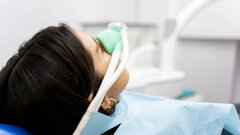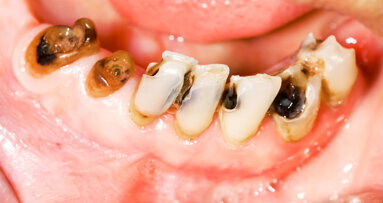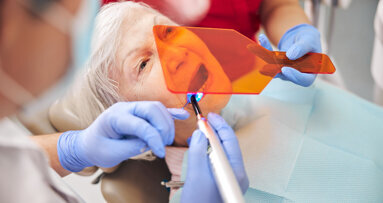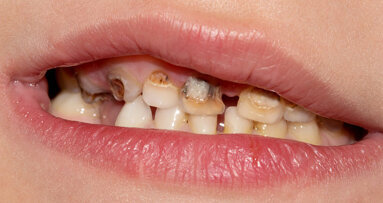EDINBURGH & GLASGOW, UK: Brushing twice a day is usually considered the most effective measure to maintain oral health in children. New research in under-5-year-olds by the universities of Edinburgh and Glasgow has now suggested, however, that it may not be enough to stop dental caries at an early age.
The reason for this, the researchers said, is most likely to be found in dietary habits. Their analysis of data from the Growing Up in Scotland study, a survey following children from infancy through to their teens, showed that those who regularly snacked were at significantly greater risk of developing caries compared with those who did not snack and ate regular meals.
Risk also increased in relation to socio-economic status, with those children having parents who were unemployed being more likely to have caries.
The research, which was supported by the Scottish government, included data from 4,000 preschool children. Reflecting on the results, the researchers said that the study shows that lifestyle changes like reducing sugar intake are as important as toothbrushing for reducing decay. Strategies to help teach children in less-well-off households proper oral hygiene when they are young also need to be addressed, they added.
“Even with targeted policies that specifically aim to reduce inequalities in children’s dental decay it remains an ongoing challenge to reduce social patterning in dental health outcomes,” said lead researcher Dr Valeria Skafida of the University of Edinburgh’s School of Social and Political Science.
According to the latest National Diet and Nutrition Survey, conducted in 2014, children in the UK consume twice as much sugar as the recommended limit. Simultaneously, a record number of children are having teeth extracted at hospitals every year.
“It is clear that tooth brushing with a fluoride toothpaste alone is not the magic wand that many people still believe it to be and preventing tooth decay also has to involve changing diet and lifestyle,” commented Chief Executive of the Oral Health Foundation Dr Nigel Carter, OBE. “Almost every single one of these operations, and the pain and suffering associated with them, could have been prevented with effective behaviour changes to help protect children’s oral health.”
The study, titled “Positive association between sugar consumption and dental decay prevalence independent of oral hygiene in pre-school children: A longitudinal prospective study”, was published online on 29 December 2017 in the Journal of Public Health.
Tags:
LONDON, UK: Together with dental caries and periodontal disease, dental erosion ranks among the top three most prevalent dental conditions. According to a ...
LONDON, UK: Despite worldwide efforts to improve oral health, a global study has found that 35 per cent of the world’s population currently suffer ...
The global dental composites market is anticipated to grow, due to changes in diet and lifestyle, and a rapidly growing geriatric population across the ...
Advances in technology in dentistry have rapidly improved diagnostics, streamlined treatments and made the dental chair a safer, more comfortable place. ...
LONDON – Global health-care company GlaxoSmithKline (GSK) has entered into a new partnership with Save the Children, an independent organisation ...
EDINBURGH, UK: A study by researchers at the University of Edinburgh has shown that a natural chemical related to those found in liquorice root could help ...
LEEDS – The main reason for English children of primary school age being admitted to hospital is multiple tooth extraction. According to the latest ...
LONDON – According to recent reports, dentists have been warning that there has been an increase in the number of patients suffering with bruxism, or ...
LONDON, England: A new national campaign led by ORDO is urging the UK government to abolish the so-called “tooth tax” by removing VAT from children’s ...
Live webinar
Tue. 24 February 2026
6:00 pm UTC (London)
Prof. Dr. Markus B. Hürzeler
Live webinar
Tue. 24 February 2026
8:00 pm UTC (London)
Prof. Dr. Marcel A. Wainwright DDS, PhD
Live webinar
Wed. 25 February 2026
4:00 pm UTC (London)
Prof. Dr. Daniel Edelhoff
Live webinar
Wed. 25 February 2026
6:00 pm UTC (London)
Live webinar
Thu. 26 February 2026
1:00 am UTC (London)
Live webinar
Tue. 3 March 2026
4:00 pm UTC (London)
Dr. Omar Lugo Cirujano Maxilofacial
Live webinar
Wed. 4 March 2026
1:00 am UTC (London)
Dr. Vasiliki Maseli DDS, MS, EdM



 Austria / Österreich
Austria / Österreich
 Bosnia and Herzegovina / Босна и Херцеговина
Bosnia and Herzegovina / Босна и Херцеговина
 Bulgaria / България
Bulgaria / България
 Croatia / Hrvatska
Croatia / Hrvatska
 Czech Republic & Slovakia / Česká republika & Slovensko
Czech Republic & Slovakia / Česká republika & Slovensko
 France / France
France / France
 Germany / Deutschland
Germany / Deutschland
 Greece / ΕΛΛΑΔΑ
Greece / ΕΛΛΑΔΑ
 Hungary / Hungary
Hungary / Hungary
 Italy / Italia
Italy / Italia
 Netherlands / Nederland
Netherlands / Nederland
 Nordic / Nordic
Nordic / Nordic
 Poland / Polska
Poland / Polska
 Portugal / Portugal
Portugal / Portugal
 Romania & Moldova / România & Moldova
Romania & Moldova / România & Moldova
 Slovenia / Slovenija
Slovenia / Slovenija
 Serbia & Montenegro / Србија и Црна Гора
Serbia & Montenegro / Србија и Црна Гора
 Spain / España
Spain / España
 Switzerland / Schweiz
Switzerland / Schweiz
 Turkey / Türkiye
Turkey / Türkiye
 UK & Ireland / UK & Ireland
UK & Ireland / UK & Ireland
 International / International
International / International
 Brazil / Brasil
Brazil / Brasil
 Canada / Canada
Canada / Canada
 Latin America / Latinoamérica
Latin America / Latinoamérica
 USA / USA
USA / USA
 China / 中国
China / 中国
 India / भारत गणराज्य
India / भारत गणराज्य
 Pakistan / Pākistān
Pakistan / Pākistān
 Vietnam / Việt Nam
Vietnam / Việt Nam
 ASEAN / ASEAN
ASEAN / ASEAN
 Israel / מְדִינַת יִשְׂרָאֵל
Israel / מְדִינַת יִשְׂרָאֵל
 Algeria, Morocco & Tunisia / الجزائر والمغرب وتونس
Algeria, Morocco & Tunisia / الجزائر والمغرب وتونس
 Middle East / Middle East
Middle East / Middle East
















































To post a reply please login or register